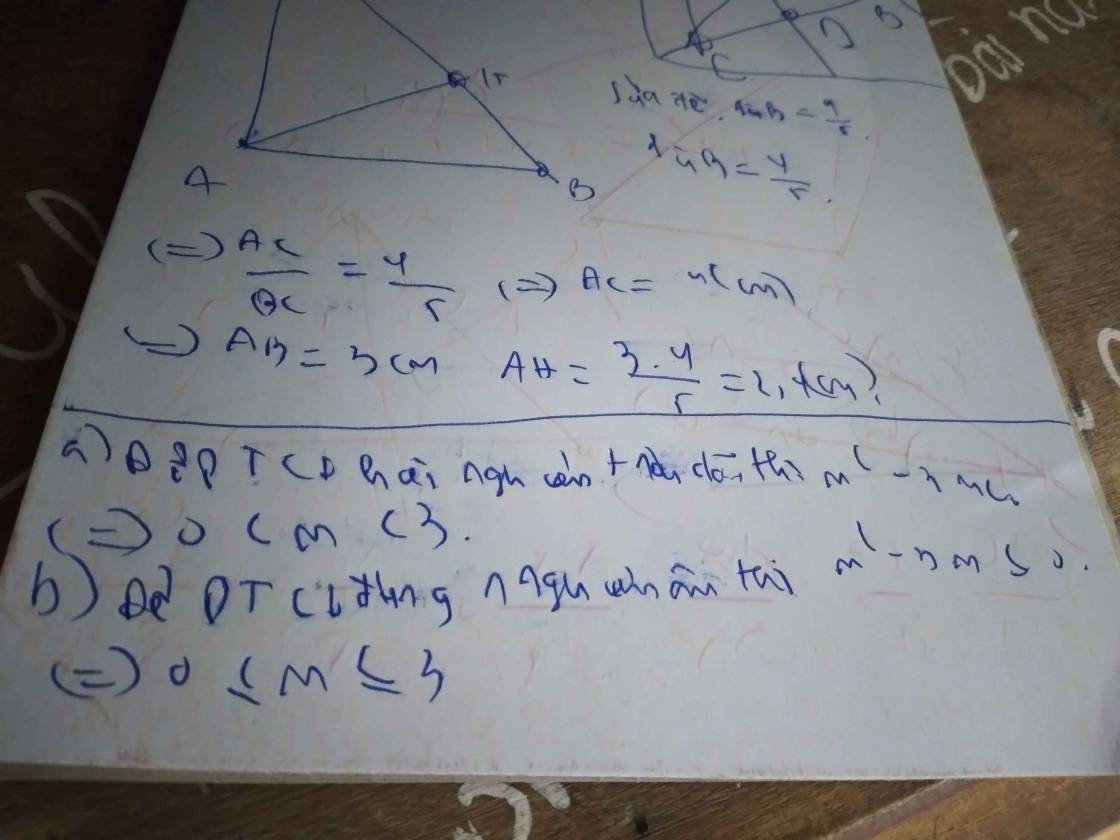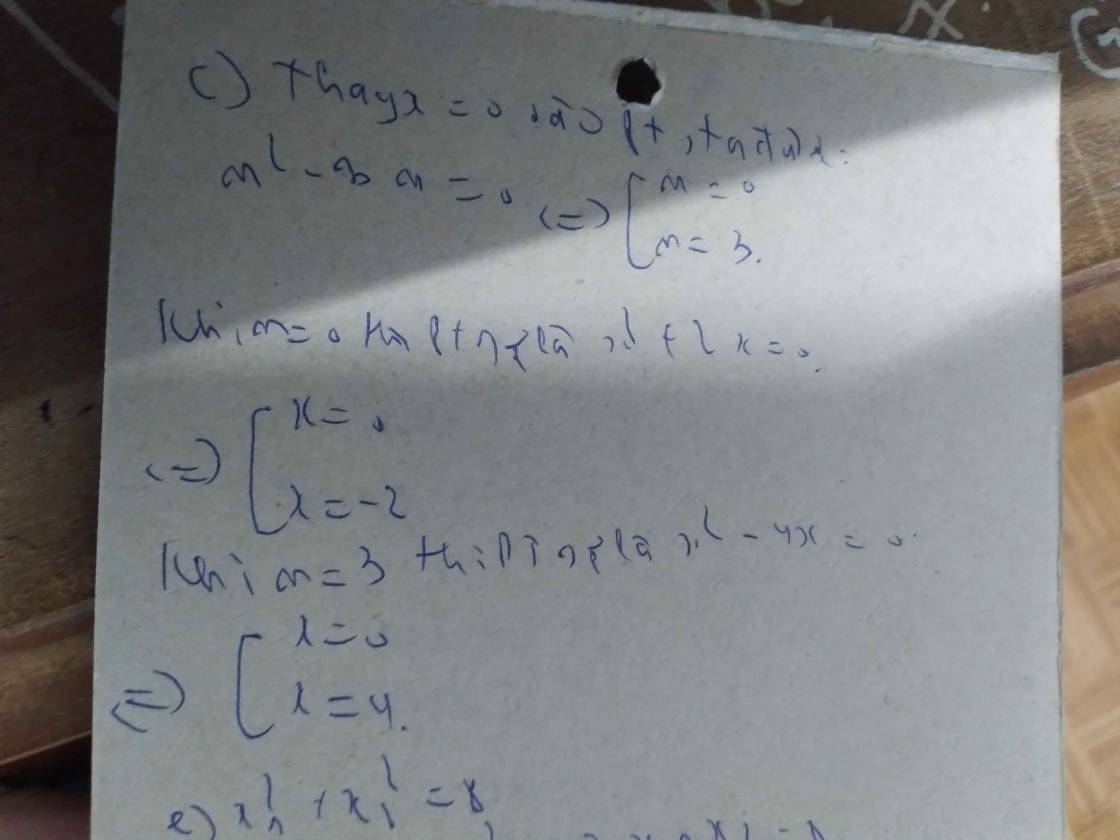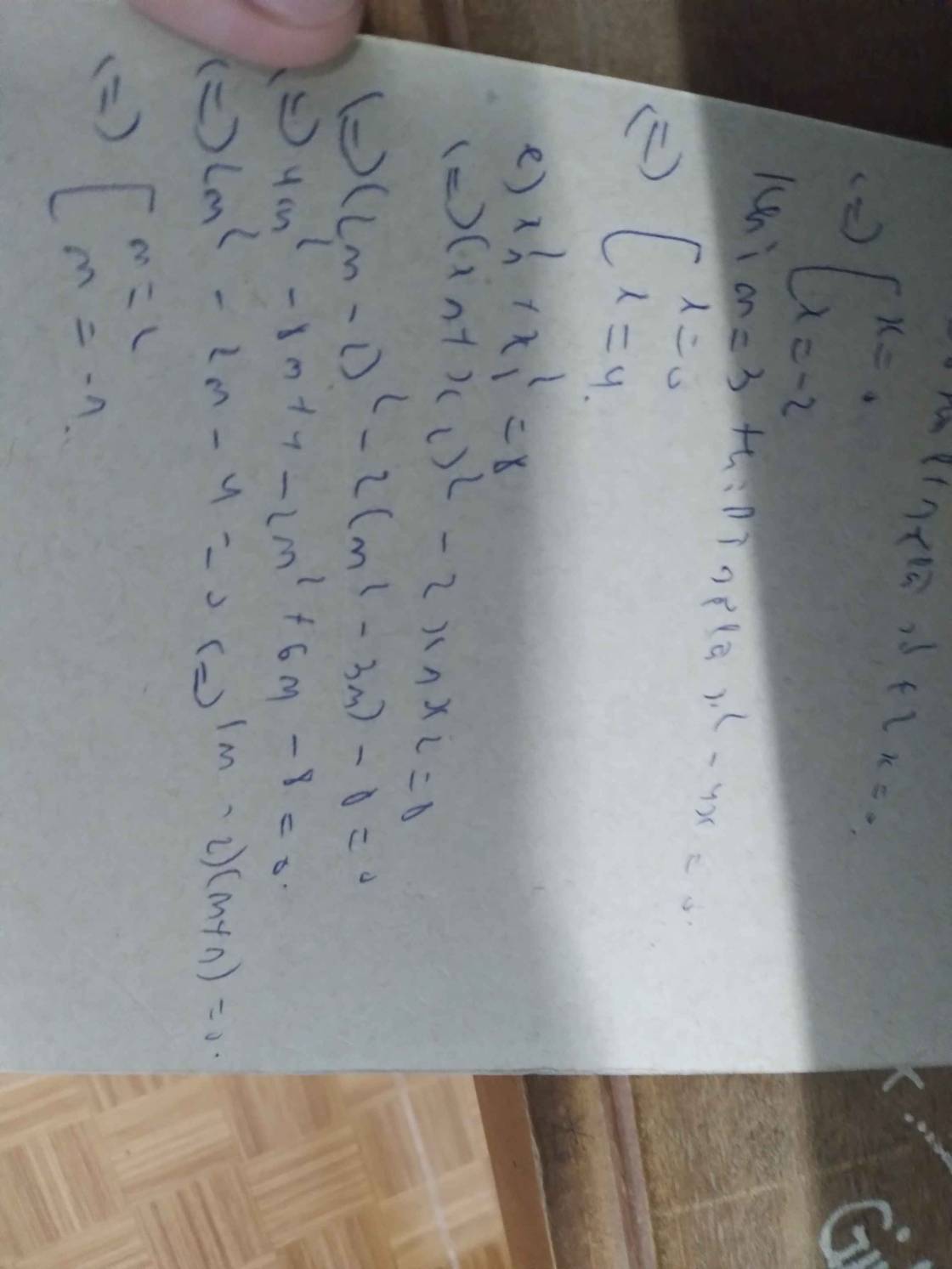Hãy nhập câu hỏi của bạn vào đây, nếu là tài khoản VIP, bạn sẽ được ưu tiên trả lời.

a/ \(m=4\to x^2-8x+7=0\\\leftrightarrow x^2-7x-x+7=0\\\leftrightarrow x(x-7)-(x-7)=0\\\leftrightarrow (x-1)(x-7)=0\\\leftrightarrow x-1=0\quad or\quad x-7=0\\\leftrightarrow x=1\quad or\quad x=7\)
b/ Pt có 2 nghiệm phân biệt
\(\to \Delta=(-2m)^2-4.1.(2m-1)=4m^2-8m+4=4(m^2-2m+1)=4(m-1)^2\ge 0\)
\(\to m\in \mathbb R\)
c/ Theo Viét
\(\begin{cases}x_1+x_2=2m\\x_1x_2=2m-1\end{cases}\)
Tổng bình phương các nghiệm là 10
\(\to x_1^2+x_2^2\\=(x_1+x_2)^2-2x_1x_2=(2m)^2-2.(2m-1)=4m^2-4m+2\)
\(\to 4m^2-4m+2=10\)
\(\leftrightarrow 4m^2-4m-8=0\)
\(\leftrightarrow m^2-m-2=0\)
\(\leftrightarrow m^2-2m+m-2=0\)
\(\leftrightarrow m(m-2)+(m-2)=0\)
\(\leftrightarrow (m+1)(m-2)=0\)
\(\leftrightarrow m+1=0\quad or\quad m-2=0\)
\(\leftrightarrow m=-1(TM)\quad or\quad m=2(TM)\)
Vậy \(m\in\{-1;2\}\)

1.a
ta có: \(\Delta'=m^2-\left(m-1\right)\left(m+1\right)\)
= m^2-m^2+1=1>0
vậy pt luôn có 2 no vs mọi m
a)\(\Delta=m^2-\left(m+1\right)\left(m-1\right)=m^2-m^2+1=1\)
Vậy pt luôn có 2 nghiệm với mọi m
b)
Theo hệ thức Vi ét ,ta có:
\(\hept{\begin{cases}x_1+x_2=\frac{2m}{m-1}\\x_1\cdot x_2=\frac{m+1}{m-1}=1+\frac{2}{m-1}\end{cases}}\)
mà \(\frac{m+1}{m-1}=5\Rightarrow m=1,5\)
vậy \(x_1\cdot x_2=\frac{2m}{m-1}=6\)
\(\hept{\begin{cases}x_1+x_2=\frac{2m}{m-1}=2+\frac{2}{m-1}\\x_1\cdot x_2=\frac{m+1}{m-1}=1+\frac{2}{m-1}\end{cases}}\)
\(\Rightarrow x_1+x_2-x_1\cdot x_2=2+\frac{2}{m-1}-1-\frac{2}{m-1}=1\)
c)
\(\frac{x_1}{x_2}+\frac{x_2}{x_1}+\frac{5}{2}=0\Rightarrow\frac{x_1^2+x_2^2+2x_1x_2+3x_1x_2}{2x_1x_2}=0\Rightarrow\left(x_1+x_2\right)^2+3x_1x_2=0\)
\(\Leftrightarrow\left(\frac{2m}{m-1}\right)^2+\frac{3\left(m+1\right)}{m-1}=0\Rightarrow m=\pm\sqrt{\frac{3}{7}}\)

b: Để phương trình có hai nghiệm trái dấu thì (m+2)(m-4)<0
=>-2<m<4



bạn cap cả bài nhìn đau mắt gê :3
a) Thay \(m=-5\) vào PT ta được:
\(x^2-\left(-5\right)x+2.\left(-5\right)-3=0\)
\(\Rightarrow x^2+5x-10-3=0\)
\(\Rightarrow x^2+5x-13=0\)
\(\Delta=5^2-4.1.\left(-13\right)=25+52=77>0\)
PT có 2 nghiệm phân biệt:
\(x_1=-\frac{5+\sqrt{77}}{2}\)
\(x_2=-\frac{5-\sqrt{77}}{2}\)
Vậy với m = -5 thì PT có nghiệm là \(S=\left\{-\frac{5+\sqrt{77}}{2};-\frac{5-\sqrt{77}}{2}\right\}\)
b) PT có nghiệm kép \(\Leftrightarrow\Delta=0\Leftrightarrow\left(-m\right)^2-4.1.\left(2m-3\right)=0\)
\(\Leftrightarrow m^2-8m+12=0\Leftrightarrow\left(m-2\right)\left(m-6\right)=0\)
\(\Leftrightarrow\int^{m-2=0}_{m-6=0}\Leftrightarrow\int^{m=2}_{m=6}\)
Vậy với m = 2 và m = 6 thì PT có nghiệm kép.
c) PT có 2 nghiệm trái dấu \(\Leftrightarrow\int^{\Delta>0}_{2m-3<0}\Leftrightarrow\int^{m>6}_{m<\frac{3}{2}}\)(vô lí)
Vậy không có giá trị nào của m thỏa mãn PT có 2 nghiệm trái dấu.
d) Ta có: \(S=x_1+x_2=-\frac{b}{a}=-\frac{\left(-m\right)}{1}=m\)
\(\Rightarrow m=S^{\left(1d\right)}\)
\(P=x_1x_2=\frac{c}{a}=\frac{2m-3}{1}=2m-3\)
\(\Rightarrow2m-3=P\Rightarrow2m=P+3\Rightarrow m=\frac{P+3}{2}^{\left(2d\right)}\)
Từ \(\left(1d\right)\&\left(2d\right)\)
\(\Rightarrow S=\frac{P+3}{2}\Rightarrow2S=P+3\)
\(\Rightarrow P+3-2S=0\)
\(\Rightarrow x_1x_2+3-2\left(x_1+x_2\right)=0\)
\(\Rightarrow x_1x_2-2x_1-2x_2+3=0\)
Đây là hệ thức giữa 2 nghiệm không phụ thuộc vào m.
e) PT có 2 nghiệm phân biệt \(\Leftrightarrow\Delta>0\Leftrightarrow m>6\)